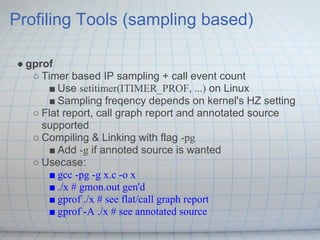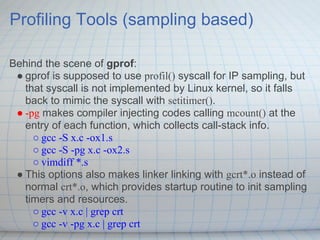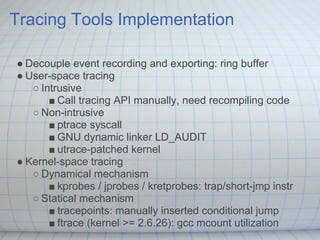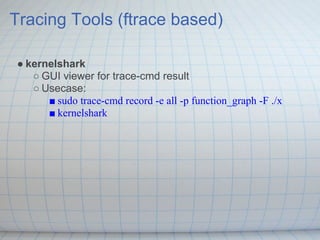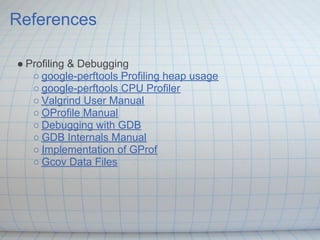TIP1 - Overview of C/C++ Debugging/Tracing/Profiling Tools
- 1. TIP1: Linux Dev Tools/Tips for C/C++ Debugging/Tracing/Profiling
- 2. Agenda ● Preface ● Concepts ● Tools for C/C++ ○ Debugging ○ Tracing ○ Profiling ● References ● Postscript
- 3. Preface ● What does our world look like? "There is no remembrance of former things; neither shall there be any remembrance of things that are to come with those that shall come after." -- Ecclesiastes 1:11 We want/need/have to change this... TIP = Technology Inheritance Program
- 4. Concepts ● Debugging - Find the cause of unexpected program behavior, and fix it. ● Profiling - Analyze program runtime behavior, provide statistical conclusions on key measurements (speed/resource/...). ● Tracing - Temporally record program runtime behavior, provide data for further debugging/profiling. All debugging/profiling/tracing tools depend on some kind of instrumentation mechanism, either statical or dynamical.
- 5. Debugging tools for C/C++
- 6. Debugging Tools Implementation ● Breakpoint support ○ Hardware breakpoint ■ DR0~7 regs on Intel CPU ○ Software breakpoint ■ INT3 instruction on x86/x86_64 ■ raise SIGTRAP signal for portable breakpoint ○ Virtual Machine Interpreter ■ Interpret instructions instead of execute it directly ● Linux user-space debug infrastructure ○ ptrace syscall
- 7. Debugging Tools ● gdb - General-purpose debugger ○ ptrace-based ○ Both hw/sw breakpoints supported ○ Reverse executing feature in 7.x version ■ Save reg/mem op before each instr executed, heavy but very handy ○ Usecases: ■ Standalone debug ■ gdb --args <exec> <arg1> <...> ■ Analyze core ■ gdb <exec> <core> ■ Attach to existing process ■ gdb <exec> <pid> ○ Many resources, search and learn:)
- 8. Debugging Tools ● Valgrind family ○ valgrind is an instruction interpreter/vm framework ○ Impossible to attach to a running process :( ○ Useful plugin: ■ memcheck ■ Memory error detector ■ massif ■ Heap usage profiler ■ helgrind ■ Thread error detector ■ DRD ■ (another) Thread error detector ■ ptrcheck(SGCheck) ■ Stack/global array overrun detector
- 9. Debugging Tools ● memcheck usecases: ○ Check memory error for all process in hierarchy: ■ valgrind --tool=memcheck --leak-check=full --leak- resolution=high --track-origins=yes --trace-children=yes -- log-file=./result.log <exec> ○ See flags specified to memchek plugin: ■ valgrind --tool=memcheck --help
- 10. Debugging Tools ● massif usecases: ○ Stats heap and stack usage during a program's life: ■ valgrind --tool=massif --stacks=yes <exec> ■ ms_print massif.* ○ In the output of ms_print: ■ ':' means normal snapshot ■ '@' means detail snapshot ■ '#' means peak snapshot in all
- 11. Debugging Tools ● helgrind usecase: ○ Check POSIX thread API misuse/inconsistent lock order/data races: ■ valgrind --tool=helgrind <exec> ● DRD usecase: ○ Check POSIX thread API misuse/data races/lock contention, and tracing all mutex activities: ■ valgrind --tool=drd --trace-mutex=yes <exec> ● ptrcheck usecase: ○ Check stack/global array overrun: ■ valgrind --tool=exp-ptrcheck <exec>
- 12. Debugging Tools ● Intel Inspect XE (Commercial) ○ Cross-platform proprietary debugging tools ○ Both GUI/CLI usage supported ○ Memory/thread error detector ○ Free for non-commercial use ○ Included in Intel Parallel Studio suite, standalone download available ○ Catch up very slow on new hardwares (e.g. i7...) ○ Works not well on Linux platform, other platform not tested...
- 13. Debugging Guideline ● Generally speaking, all programs should pass Valgrind memcheck/ptrcheck checking, to eliminate most of the memory errors. ● Multithread programs should pass Valgrind helgrind/drd checking, to eliminate common racing errors. ● Valgrind massif can be used to track down the origin of unexpected heap allocation. ● gdb can be used to manually track down logical bugs in the code. ● Multiprocess/thread programs don't fit gdb well, most of the time tracing the program is much easier/faster to find the source of a bug than manually gdb debugging.
- 14. Profiling tools for C/C++
- 15. Profiling Tools Implementation ● Event based profiling ○ Add hook for specified event, count event occuring times ● Sampling based profiling ○ Make a repeating trigger for sampling ○ Record instruction counter and call stack when trigger'd ○ Generate statistically result based on record data NOTE: General profiling tools can NOT reveal sleeping (interruptible blocking, lock wait, etc.) or I/O blocking (non- interruptible blocking) costs! But these are usually the main throttle to the intuitive runtime performance.
- 16. Profiling Tools (event based) ● gcov ○ A coverage testing tool, but can also be used as a line- count profiling tool (user-space only) ○ Need statistically instrument target program, compiling with one of the following gcc flags: ■ --coverage ■ -fprofile-arcs -ftest-coverage ○ When program exits normally, *.gcda/gcno file will be generated ○ Usecase: ■ gcc --coverage x.c -ox ■ gcov x.c # gen x.c.gcov ■ less x.c.gcov
- 17. Profiling Tools (event based) Behind the scene of gcov: ● -ftest-coverage makes compiler generating *.gcno files, which contains infos to reconstruct basic block graph and assign source codes to blocks (used by gcov). ● -fprofile-arcs makes compiler injecting codes adding counters associated with each source code line, and codes that dump out *.gcda files when the program exits. ● See: ○ gcc -S x.c -o x1.s ○ gcc -S --coverage x.c -o x2.s ○ vimdiff *.s
- 18. Profiling Tools (event based) ● lcov ○ Graphical gcov front-end ○ Generate beautiful coverage report in HTML format ○ Usecase: ■ Assuming the source is placed in app/x.c ■ cd app ■ gcc --coverage x.c -ox ■ ./x ■ lcov -d . -c -o x.info ■ genhtml -o report x.info ■ See app/report/index.html for report
- 19. Profiling Tools (event based) ● valgrind (callgrind) ○ Instruction level profiler, with cool GUI frontend kcachegrind ○ Cache/branch prediction profiling and annotated source supported ■ Add -g compiler flag if annotated source is wanted ○ Usecase: ■ gcc -g x.c -ox ■ valgrind --tool=callgrind --dump-instr=yes --cache- sim=yes --branch-sim=yes ./x ■ kcachegrind callgrind.*
- 20. Profiling Tools (sampling based) ● gprof ○ Timer based IP sampling + call event count ■ Use setitimer(ITIMER_PROF, ...) on Linux ■ Sampling freqency depends on kernel's HZ setting ○ Flat report, call graph report and annotated source supported ○ Compiling & Linking with flag -pg ■ Add -g if annoted source is wanted ○ Usecase: ■ gcc -pg -g x.c -o x ■ ./x # gmon.out gen'd ■ gprof ./x # see flat/call graph report ■ gprof -A ./x # see annotated source
- 21. Profiling Tools (sampling based) Behind the scene of gprof: ● gprof is supposed to use profil() syscall for IP sampling, but that syscall is not implemented by Linux kernel, so it falls back to mimic the syscall with setitimer(). ● -pg makes compiler injecting codes calling mcount() at the entry of each function, which collects call-stack info. ○ gcc -S x.c -ox1.s ○ gcc -S -pg x.c -ox2.s ○ vimdiff *.s ● This options also makes linker linking with gcrt*.o instead of normal crt*.o, which provides startup routine to init sampling timers and resources. ○ gcc -v x.c | grep crt ○ gcc -v -pg x.c | grep crt
- 22. Profiling Tools (sampling based) ● google-perftools (CPU profiler) ○ Timer based call-stack sampling ■ Use setitimer(ITIMER_PROF, ...) on Linux ■ Set sampling freqency through env var PROFILEFREQUENCY ○ Linked-in usage (NOTE: profiler symbols must be referenced in your code, otherwise the dependency of profiler shared library will be eliminated!) ■ gcc -g x.c -ox -lprofiler ■ CPUPROFILE=/tmp/xxx ./x ○ Preload usage: ■ LD_PRELOAD=/usr/local/lib/libprofiler.so CPUPROFILE=/tmp/xxx ./x ○ Show report: pprof --text ./x /tmp/xxx
- 23. Profiling Tools (sampling based) ● oprofile ○ Support timer/interrupt/PMC/tracepoint based sampling ■ PMC = PerforMance Counter ○ Capable of doing system-wide profiling ○ Deprecated in prefer of perf on kernel > 2.6.26(?) ○ Usecase: ■ sudo opcontrol --init # load oprofile module ■ sudo opcontrol -s ■ ./x ■ sudo opcontrol -h ■ sudo opreport # show report ■ sudo opannotate -s # show annotated src
- 24. Profiling Tools (sampling based) ● perf ○ Available on kernel >= 2.6.26(?) ○ PMC frontend released along with kernel itself ○ Support PMC/tracepoint based sampling ○ Capable of doing system-wide profiling, sampling events trace can also be output ○ Usecase: ■ sudo perf record -a -g -- ./x ■ sudo perf report # show prof report ■ sudo perf annotate # show annotated src
- 25. Profiling Tools (sampling based) ● Intel VTune Amplifier XE (Commercial) ○ PMC/timer based sampling, support GUI/CLI ○ System-wide profiling supported, has locks & waits analysis ○ Use Pin for instrumentation ○ CLI works well on Linux, GUI not stable ■ amplxe-cl -collect hotspots ./x ■ amplxe-cl -report hotspots -r rxxxxhs ● AMD CodeAnalyst (Commercial) ○ oprofile based, GUI only ○ System-wide profiling supported ○ Provide much more events on AMD CPUs ○ Works not well on Linux
- 26. Profiling Guideline ● Determine target program performance throttle before actual profiling (time helps) ○ sys time + user time ~ wall clock time ■ sys time >> user time: reduce syscalls / user-kernel space profiling ■ user time >> sys time: user space profiling ○ sys time + user time << wall clock time ■ Don't use general profiling tool, consider user space tracing ● Analysis profiling result hierarchically, starting from outter scope first, don't dive into details too early. ● Spot performance throttle one by one. First deal with the biggest known throttle, then profiling again and find the next throttle.
- 27. Tracing tools for C/C++
- 28. Tracing Tools Implementation ● Decouple event recording and exporting: ring buffer ● User-space tracing ○ Intrusive ■ Call tracing API manually, need recompiling code ○ Non-intrusive ■ ptrace syscall ■ GNU dynamic linker LD_AUDIT ■ utrace-patched kernel ● Kernel-space tracing ○ Dynamical mechanism ■ kprobes / jprobes / kretprobes: trap/short-jmp instr ○ Statical mechanism ■ tracepoints: manually inserted conditional jump ■ ftrace (kernel >= 2.6.26): gcc mcount utilization
- 29. Tracing Tools (ptrace based) ● strace ○ Trace user program's syscalls ○ Support existing process tracing ■ Watch out ptrace protection patch! (for nonroot) /proc/sys/kernel/yama/ptrace_scope ○ Works well with multithread programs ○ Usecase: ■ strace -f -i -tt -T -v -s 1024 -C -o trace.out ./x ■ See man strace for detail description
- 30. Tracing Tools (ptrace based) ● ltrace ○ Trace user program's dynamic library calls ○ Can also trace syscalls, but can't parse their args as strace did ○ Neither library->library nor dlopen'd library call trace supported ○ Can NOT work with multithread programs ○ Usecase: ■ ltrace -C -f -i -n4 -s1024 -S -tt -T ./x ■ See man ltrace for detail description
- 31. Tracing Tools (ptrace based) ● Ptrace-based tracing shortcoming: ○ Heavy overhead, at least 2 ctx sw + 2 syscall plus signal transit overheads per tracepoint, very slow on large tracepoint set; ○ init(1) can not be traced; ○ Processes can not be ptraced by multiple tracers; ○ Ptrace affects the semantics of traced processes: ■ Original parent will not be notified when its child was ptraced and stopped (see notes in man 2 ptrace) ■ The overhead of ptrace will lower the num of concurrent running threads. Race conditions sensitive to timings may disappear due to this, resulting a Heisenberg problem.
- 32. Tracing Tools (LD_AUDIT based) ● latrace ○ Trace user program's dynamic library calls ○ Can NOT trace existing process ○ Use callback function running in target process instead of ptrace signals, much lower overhead ○ Works well with multithread programs ○ Usecase: ■ latrace -SAD -o trace.out ./x ■ See man latrace for detail description
- 33. Tracing Tools (ftrace based) ● trace-cmd ○ Available on kernel >= 2.6.26 ○ CLI frontend for ftrace framework ○ System-wide kernel tracer, no user space event available (except for events like context switching, scheduling etc., but no call-site info) ○ Usecase: ■ sudo trace-cmd record -e all -p function_graph -F ./x ■ trace-cmd report
- 34. Tracing Tools (ftrace based) ● kernelshark ○ GUI viewer for trace-cmd result ○ Usecase: ■ sudo trace-cmd record -e all -p function_graph -F ./x ■ kernelshark
- 35. Tracing Tools (customized) ● SystemTap ○ Linux community's reply to Solaris DTrace ○ Scriptable framework to utilize kprobes/tracepoints ○ User space tracing needs utrace-patched kernel, Redhat distros (RHEL/CentOS/Fedora) all comes with such kernels ○ Usecase: ■ stap -e 'probe syscall.* {println(thread_indent(4),"->", probefunc())} probe syscall.*.return {println(thread_indent (-4), "<-", probefunc())}' -c ./x
- 36. Tracing Tools (customized) ● LTTng 2.0 ○ Rewrite of LTTng 0.9.x, no need to patch kernel anymore, lighter weight compare to SystemTap ○ User space tracing is done by inserting statical tracepoint into user program (not compatible with SystemTap/DTrace probes yet...) ○ Usage: ■ sudo lttng create sess1 ■ sudo lttng enable-event -a -k ■ sudo lttng enable-event -a -u ■ sudo lttng start ■ ./x ■ sudo lttng stop ■ babeltrace ~/lttng/sess1*
- 37. Tracing Tools (customized) ● DTrace ○ Origins from Sun Solaris, adopted by MacOS/FreeBSD/Oracle Unbreakable Linux ○ Scriptable framework, light weight tracing overhead ○ Capable of kernel and user space joint tracing (user space tracing needs inserting statical tracepoints) ○ Handy tracing multiple languages / apps: ■ Java(Sun) / PHP(Zend) / Javascript(Firefox) / CPython / CRuby / MySQL / PostgreSQL / Erlang (DTrace fork) ○ Usecase: see http://dtracehol.com/
- 38. Tracing Guideline ● Be warned! Tracing needs invovled efforts and solid background on Linux kernel. Learn more and deeper about how the system working first! ● Use SystemTap for kernel/user space tracing on Redhat family distros (RHEL/CentOS/Fedora) or utrace-patched kernels ● Use DTrace for kernel/user space tracing on MacOS/FreeBSD ● User space only tracing can be partially done by strace/ltrace ● LTTng 2.0 can do kernel/user space tracing if you can insert statical tracepoints in your code, and it does not need patching your kernel
- 39. Practical Tips
- 40. Other useful technics ● gcc -finstrument-functions ○ https://github.com/agentzh/dodo/tree/master/utils/dodo- hook ● LD_PRELOAD crash signal handler ○ https://github.com/chaoslawful/phoenix-nginx- module/tree/master/misc/dbg_jit ● Add signal handler to normally output gprof/gcov result for a interrupted program See examples at https://github.com/chaoslawful/TIP
- 41. References ● Overview ○ Linux Instrumentation ○ http://lwn.net/Kernel/Index/ ● Tracing ○ 玩转 utrace ○ utrace documentation file ○ Introducing utrace ○ Playing with ptrace, Part I ○ Playing with ptrace, Part II ○ SystemTap/DTrace/LTTng/perf Comparison ○ ftrace 简介 ○ Solaris Dynamic Tracing Guide ○ DTrace for Linux ○ Observing and Optimizing your Application with DTrace
- 42. References ● Tracing ○ SystemTap Beginner's Guide ○ SystemTap Language Reference ○ SystemTap Tapset Reference ○ LTTng recommended bundles ○ LTTng Ubuntu daily PPA ○ An introduction to KProbes ○ 使用KProbes调试内核 ○ Tracing: no shortage of options ○ Uprobes: 11th time is the charm? ○ Ptrace, Utrace, Uprobes: Lightweight, Dynamic Tracing for User Apps ○ LTTng Tracing Book
- 43. References ● Profiling & Debugging ○ google-perftools Profiling heap usage ○ google-perftools CPU Profiler ○ Valgrind User Manual ○ OProfile Manual ○ Debugging with GDB ○ GDB Internals Manual ○ Implementation of GProf ○ Gcov Data Files
- 44. Postscript "The important thing is not to stop questioning; never lose a holy curiosity." -- Albert Einstein




















